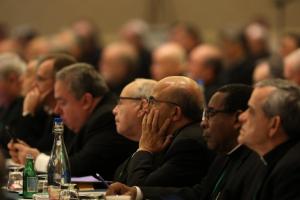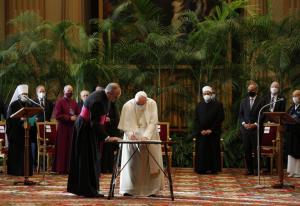Ranking abortion and climate change

The American bishops, meeting in Baltimore recently, decided not to update their longstanding “Faithful Citizenship” guide. This is their quadrennial exercise in making the Church relevant to American politics. The current version of the guide dates from 2007. Circumstances and politics have changed over the last 12 years, but this guide to voters’ consciences has not. Instead this year the bishops merely added some ancillary materials, including videos and one controversial word: preeminent. Commonweal correctly calls that way of ranking abortion among other issues a move away from conscience guiding to conscience replacing.
Preeminent or not is one discussion. Here is another, which I will describe succinctly, though a bit crassly:
If we don’t eliminate or greatly reduce the tragedy of abortion in the coming year or two, we can still do that in the next decade or two. But what we fail to do about global warming in the next very few years we will not be able to do later. The next few years will determine the quality of the natural environment as far into the future as we can imagine. It’s a question of whether or not earth will continue to sustain the human population and civilization as we know it. In the American context, with our current science-denying president, global warming is the most urgent issue facing American voters.
Preeminent or not?
The bishops give reasons for calling abortion the preeminent issue:
- It directly attacks life itself.
- It takes place within the sanctuary of the family.
- The number of lives destroyed is very large.
Calling abortion preeminent among issues, for many voters, amounts to saying let this one issue determine your vote. None of these reasons suffices for that. There are many other issues that involve direct and indirect attacks on life itself. The ability of the earth to sustain life is certainly one of these. The family is, indeed, a sanctuary; but no reason that I can think of places family above the whole planet. Jesus himself showed ambivalence about the natural family. When his mother and “brothers” were anxious to see him, he said, “Whoever does the will of God is my brother and sister and mother.” (Mark 3:35) As for the number of lives destroyed, global warming unchecked would result in a similarly catastrophic number of lives destroyed.
Issue orientation or partisanship
A statement by Portland archbishop Alexander Sample, which Commonweal quotes, seems to represent the thinking of the bishops who carried the day at that fall meeting:
We are at a unique moment with the upcoming election cycle to make a real challenge to Roe v. Wade, given the possible changes to the Supreme Court.
The American voter cannot possibly see in this statement anything other than a direction to vote Republican. The bishops have all but shed the pretense of avoiding partisan politics and focusing objectively on issues. Is that necessarily bad?
In past posts I have praised Greta Thunberg for her emotional rhetoric on climate change. Here she is speaking to the United Nations:
We are in the beginning of a mass extinction and all you can talk about is money and fairy tales of eternal economic growth—how dare you!
For such statements another Commonweal article calls her a culture warrior. Yet statements from popes are not a whole lot different. In an American context that and other admonitions from this climate activist amounts to telling voters to vote Democratic. There may be a place for partisanship in the Church or at least statements that lean heavily one way or the other. It depends on the need of the time and, especially, on the truth.
The most urgent issue and, perhaps, also pre-eminent
Week after week, from one scientific body after another, we hear increasingly dire descriptions of the consequences of global warming. Already we have raised the earth’s average temperature one degree Celsius above the pre-industrial level. Scientists have given us two major benchmarks for keeping keep warming to the reasonable and achievable level of 1.5 degrees. We need to bring fossil fuel use down to zero or near that by 2050. We need to cut our use of fossil fuels in half by 2030. Since the signing of the 2015 Paris Agreement, global greenhouse gas emissions responsible for global warming have risen by 4 percent.
Reversing that trend is not something to put off. With tipping points and feedback loops in store, one could almost say every second counts. Certainly we do not have years to wait. It will take all of the next decade to do the work that must be done. Climate change is unique among the issues in this respect. It’s now or never.
Given the huge difference on climate change between Democrats and Republicans in general and President Trump in particular, now means the next general election. Climate change outranks all the others in urgency. Can we use the bishops’ word and also call it preeminent?
The bishops put a lot of stock in numbers of lives, and I think that’s appropriate. I would ask them to look at scientific predictions concerning the number of lives that another couple degrees of global warming will cost. It isn’t just heat waves, deadly as they can be. It’s floods, droughts, migrations, and wars, of which we have seen only the beginnings. Perhaps preeminent is the wrong word for any political issue. The bishops’ use of that word this year is a disservice to American voters.
Image credit: Catholic News Service











